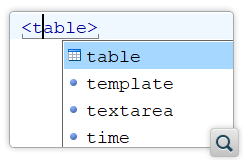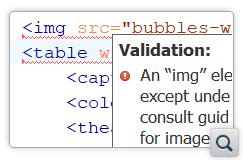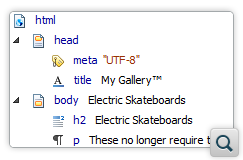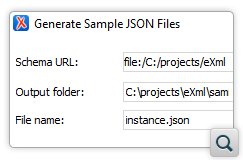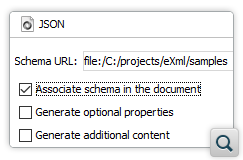What's New in Oxygen XML Developer 21.1
Version 21.1 of the Oxygen XML Developer introduces
HTML5 support (without treating it as XHTML), providing specialized text-based editing and
validation support.
The JSON support reaches maturity with new improvements and the inclusion of an instance
generator from a JSON Schema and developers can look forward to further XSLT 3.0 and XPath
improvements.
With this release, Oxygen PDF
Chemistry is no longer in a BETA stage, it is included in Oxygen as the default
PDF publishing engine and also available as a separate commercial option for
those who want to use the publishing engine outside of Oxygen.
As always, this release includes numerous other requested features, API additions, bug
fixes, and component updates.
There are changes in:
HTML
Specialized HTML Editor
Oxygen now includes a specialized
HTML editor with various
editing features for files that have the
html or
htm
file extensions. Features include a new document template, folding support, syntax
highlighting, and more.
Content Completion
The
Content Completion Assistant offers proposals for elements, attributes, and
values that are valid at the current editing location, provides annotations for many of
the proposals, as well as links to the HTML5 specification.
Validation
Oxygen includes a built-in validator used for
validating HTML documents.
It is based upon the W3C HTML Validator and the HTML documents are validated against the
W3C HTML5 specification.
Outline View
The specialized
Outline view for HTML documents handles void elements or elements that are not
closed, and presents the tree structure of the HTML document correctly.
Encoding
For HTML documents, the encoding is detected automatically based on the value
specified in the charset attribute of the meta
element.
JSON
Generate Sample JSON Files
Oxygen now includes a
tool
for generating sample JSON files. It can be found in the
Tools
menu and it opens a dialog box where you can configure various options for generating the
JSON instances.
New JSON Document Template Customization Options
The new JSON document template now includes several customization options. For
example, you can specify the path to a JSON Schema, specify that the new document will be
created using JSON Schema associated directly in the document, or specify whether or not
the new document will be created with optional properties or only the required
properties.
Improved Resolution of JSON Schema References
Improved the content completion, error localization, and Go to
Definition feature for JSON documents that use JSON Schemas with multiple
references.
XSLT
Proposals Added to Content Completion for XSLT 3.0 Accumulators
When using the accumulator-before or
accumulator-after functions in XSLT 3.0 stylesheets, the content
completion will now offer proposals for names collected from the
xsl:accumulator declaration.
Improvements to Text Value Templates
Improvements were made to the support for Text Value Templates. For example,
curly brackets inside the Text Value Templates are now handled better.
Transformation Improvements
Transforming from the Project view now works properly if
xsl:initial-template is used the source is specified using a
parameter.
Content Completion
Show Content Completion Annotations in Various Languages
Translation Support for Content Completion Annotations Using the ${i18n()}
Function
When using a configuration file to customize the Content Completion Assistant,
you now have the ability to translate the annotations for elements using the
${i18n()} function.
Other
Improved Editor Variable Interpretations
The editor variable interpreter was enhanced. For example, when mixing editor
variables in XPath expressions, Oxygen now allows nested editor variables (such as
oxy_xpath + ask + answer).
Content Completion and Syntax Highlighting when Configuring Framework Actions
When configuring custom actions for frameworks in the Document Type
Configuration wizard, the Activation XPath editor now includes content
completion and syntax highlighting to make it easier to write the XPath
expressions.
XPath Function That Returns the Platform
When configuring custom actions for frameworks in the Document Type
Configuration wizard, you can write an activation XPath expression for each activation
context. A new XPath function oxy:platform() was added that returns the
current platform that Oxygen is running on. It can be used, for example, if you want
to enable or disable an action in the Author visual editing mode depending on the
platform.
API
Multiple JavaScript Modules Allowed in WorkspaceAccessJS Extension
JavaScript-based plugins can now include
multiple modules of JavaScript files in the plugin. You can declare functions
that can be used in the main WorkspaceAccessJS JavaScript file and use those external
script files as a library of functions.
Project API Improvements
The new API
ProjectChangeListener can be used for notifications when
there are changes to the project (for example, when another project is opened). Also added
addProjectChangeListener,
removeProjectChangeListener,
and
getCurrentProjectURL methods in the
ProjectController API.
UI Components Factory
The
OxygenUIComponentsFactory API was added and it is meant for
easily creating UI components with the same appearance as the ones used in
Oxygen.
Faster Processing for API DITA Keys
The KeyDefinitionManager.isPassKeyTargetReferencesThroughXMLCatalogMappings
API method was added, and it can be used to avoid passing key reference URLs through XML
catalog URI mappings to speed up conversions when an external DITA keys resolver is being
used.
Component Updates
DITA Open Toolkit 3.3.1
Updated the bundled DITA Open Toolkit publishing engine to version
3.3.1.
Saxon Transformer Add-on 9.9.1.2
CSS Validator 1.0.4
Updated the W3C CSS Validator library to version 1.0.4.
JSON Everit Validation Engine 1.11.1
Updated the JSON Everit validation engine to 1.11.1.
eXist 4.6.0
Oxygen officially supports version 4.6.0 of the eXist
database.
Calabash 1.1.21
Updated the Calabash engine to version 1.1.21.

